How to Watch the “Halloween” Movies in Order
- Oops!Something went wrong.Please try again later.
- Oops!Something went wrong.Please try again later.
- Oops!Something went wrong.Please try again later.
- Oops!Something went wrong.Please try again later.
- Oops!Something went wrong.Please try again later.
- Oops!Something went wrong.Please try again later.
- Oops!Something went wrong.Please try again later.
John Carpenter's original Halloween debuted in 1978 and spawned 12 more movies
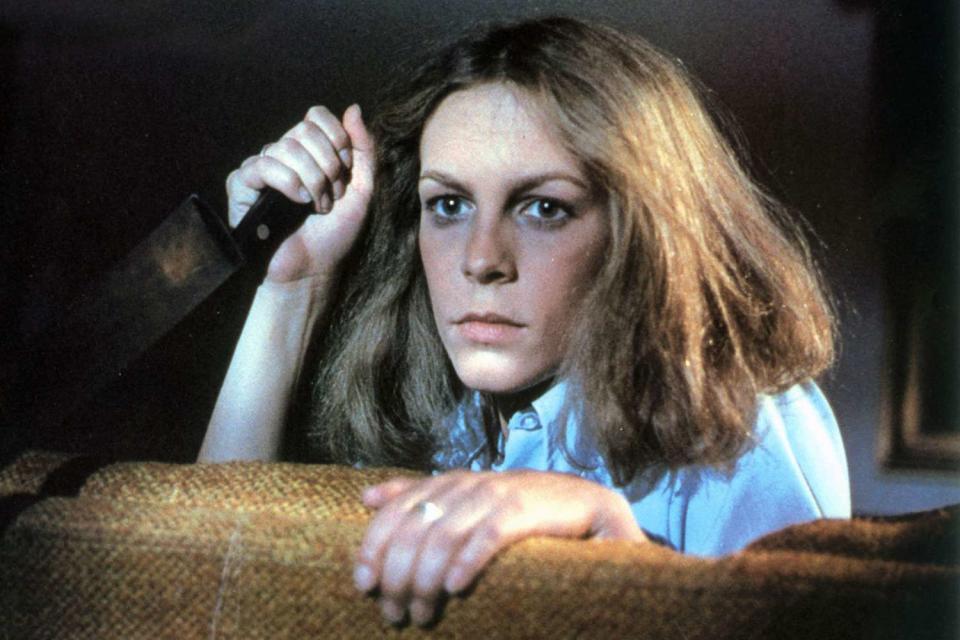
Halloween changed horror movies forever and launched a franchise that spanned more than four decades.
John Carpenter's classic introduced Michael Myers — also called "The Shape" — and Jamie Lee Curtis as formidable final girl Laurie Strode to audiences in 1978. The film largely inspired the slasher sub-genre and established Curtis as a scream queen.
The original flick spawned 12 additional movies, and the franchise has made more than $1 billion and counting. To this day, the original 1978 Halloween is considered one of the best horror movies in history.
Curtis credits playing Laurie Strode in Halloween with not only with making her a star, but also with setting off a chain of events in her life that led to her marry Christopher Guest and eventually expand her acting horizons into comedy.
"As I write this, I keep connecting the dots," Curtis wrote in a PEOPLE essay in 2022. "If I hadn't been in Halloween, I wouldn't have met John Landis, the director who put me in Trading Places and showed the world I can be funny. That got me A Fish Called Wanda. That led to True Lies, which led to Freaky Friday. Dot connected, dot connected."
Connecting the dots of the actual Halloween movie timeline, however, can be a bit tricky. There are three different timelines for Curtis' arc as Laurie Strode in the Halloween franchise, plus Zombie's standalone films and another Halloween franchise movie that barely connects to the others at all.
Ahead, we break down how to watch the Halloween movies in order in each timeline, as well as chronologically in order of release date.
Halloween Movies in Release Date Order
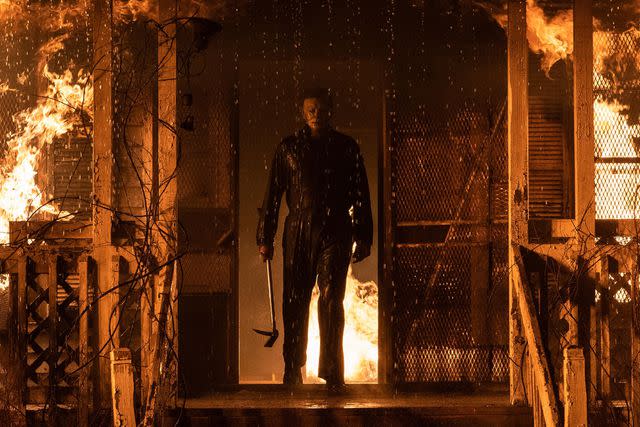
Ryan Green/Universal Pictures/THA/Shutterstock
James Jude Courtney in Halloween KillsHalloween (1978)
Halloween II (1981)
Halloween III: Season of the Witch (1982)
Halloween 4: The Return of Michael Myers (1988)
Halloween 5: The Revenge of Michael Myers (1989)
Halloween: The Curse of Michael Myers (1995)
Halloween H20: 20 Years Later (1998)
Halloween: Resurrection (2002)
Halloween (2007)
Halloween 2 (2009)
Halloween (2018)
Halloween Kills (2021)
Halloween Ends (2022)
Halloween Movies in Chronological Order
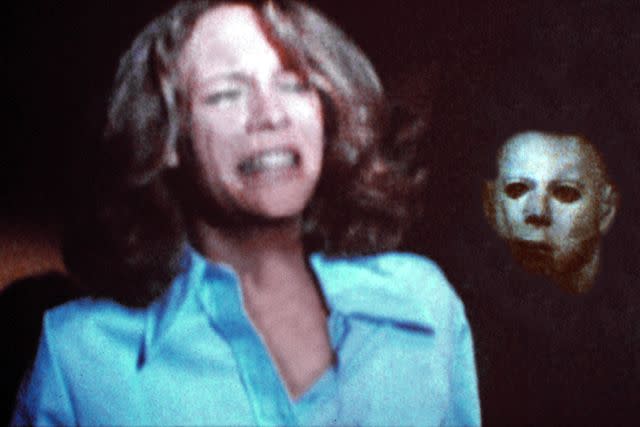
The Original Halloween Timeline
Halloween (1978)
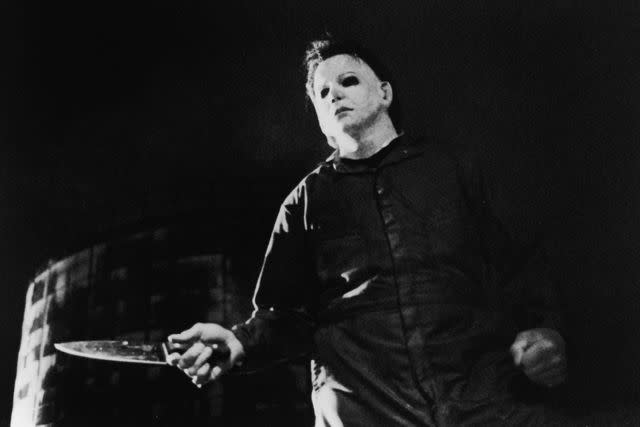
Fotos International/Courtesy of Getty
Tony Moran in HalloweenCurtis was just 19 years old the first time she played Laurie Strode in the original Halloween. She wrote in an essay for PEOPLE that the film began as an idea from film producer and financier, Moustapha Akkad, who "wanted to make a 'babysitter-slasher movie.' "
She recalled that Carpenter, then an unknown, and his girlfriend Debra Hill developed the story for Halloween from that prompt.
"They added high school girls who strolled down tree-lined streets and teased each other about boys. They threw in children who needed babysitters and then a carnival, which led to dressing up in costumes on Halloween night," she wrote. "The final ingredient in that idyll: a man in a white mask who would become the embodiment of pure evil. This was a powerful recipe."
Curtis was paid $8,000 for Halloween, calling it "a fortune" for the time, especially for her first leading role. The film, produced for just $300,000, raked in $47 million at the box office and went on to become the most commercially successful independent movie ever at the time.
Halloween II (1981)
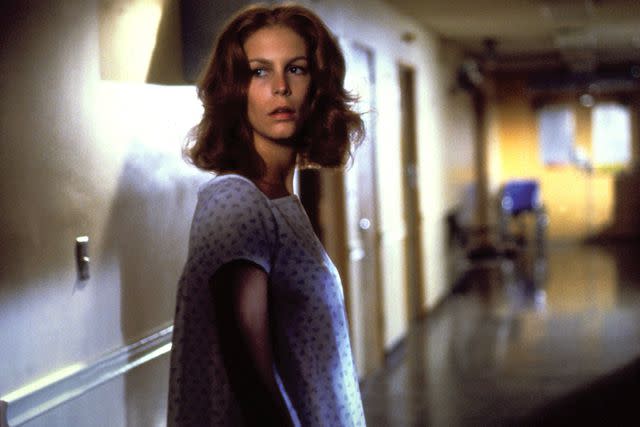
Following the success of Halloween, Curtis returned for Halloween II, released in 1981. Carpenter and Hill produced and wrote the screenplay for the sequel, with Rick Rosenthal directing.
The film begins one minute after the events of Halloween: Laurie Strode is hospitalized, and Michael Myers stalks her and brutally murders anyone who gets in his way.
Rosenthal said in a 2002 interview that while he wanted to remain loyal to Carpenter's original vision of Halloween, he also wanted to put his own stamp on Halloween II.
"You have to try hard to maintain the style of the first movie. I wanted it to feel like a two-parter," he explained. "You have the responsibility and the restraints of the style that's been set. It was the same crew. My philosophy was to do more of a thriller than a slasher movie."
Halloween II reveals that Strode is actually Myers' younger sister who was adopted after their parents' deaths, with the records sealed to protect her. This aspect of the storyline was later dropped.
Halloween 4: The Return of Michael Myers (1988)
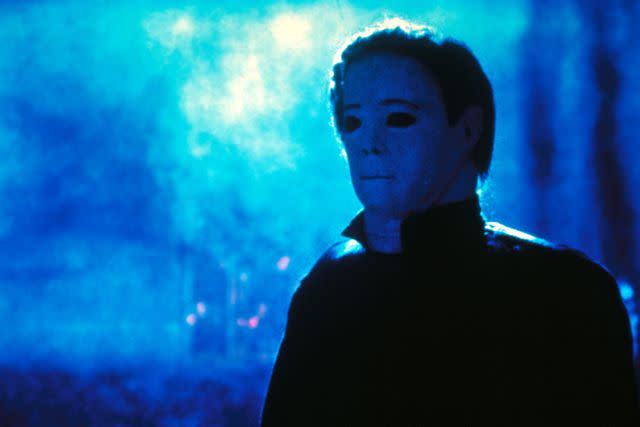
Moviestore/Shutterstock
'Halloween 4: The Return Of Michael Myers'Released a decade after the first Halloween, other than being based on the characters Carpenter created, Halloween 4: The Return of Michael Myers had no involvement from the franchise's creator — nor from Curtis, who only appears as in a photograph, with Laurie Strode being written out of the film and dying offscreen.
The only returning cast member from the first two Halloween films was Donald Pleasence as Michael Myers' psychiatrist, Dr. Samuel Loomis.
Halloween 4 takes place a decade after the events of Halloween II, with Michael Myers having been comatose for the past 10 years. While being transferred from Haddonfield Memorial Hospital to a sanitarium, Myers hears ambulance personnel mention that he has a niece — Laurie Strode's daughter, Jamie Lloyd (played by Danielle Harris). Jamie lives with a foster family. Myers brutally and relentlessly pursues Jamie throughout Haddonfield, leaving countless people dead in his wake.
Screenwriter Dennis Etchison originally wrote the script for Halloween 4 with Carpenter and Hill, and it was quite different, with a Footloose-style ban of Halloween in Haddonfield. However, creative differences reportedly led Carpenter and Hill to exit and sell their rights to the Halloween franchise, and the studio went with a script from Alan McElroy instead. McElroy penned Halloween 4: The Return of Michael Myers in just 10 days, completing it just before a writers' strike.
Halloween 5: The Revenge of Michael Myers (1989)
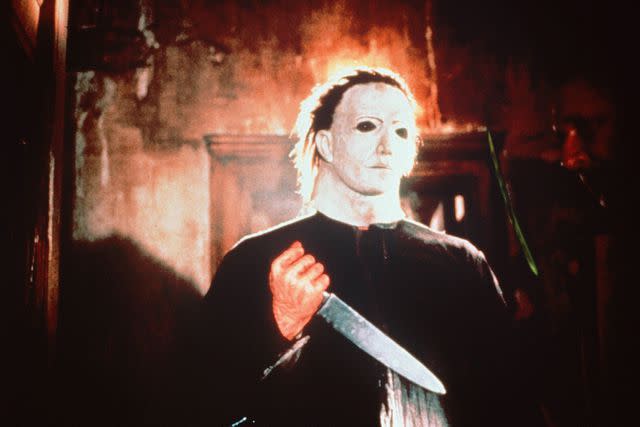
Magnum/Kobal/Shutterstock
Donald L. Shanks in Halloween 5: The Revenge of Michael MyersThe fifth installment, Halloween 5: The Revenge of Michael Myers, premiered on Oct. 13, 1989. Taking place one year after the events of Halloween 4: The Return of Michael Myers, Pleasence and Harris reprised their roles of Dr. Loomis and Jamie Lloyd, with Michael Myers continuing to pursue his niece.
Halloween 5 presents more supernatural elements than previous Halloween films, with Jamie having a telepathic connection to her murderous uncle, and Michael Myers being cursed and controlled by a cult to kill his family members.
Halloween: The Curse of Michael Myers (1995)
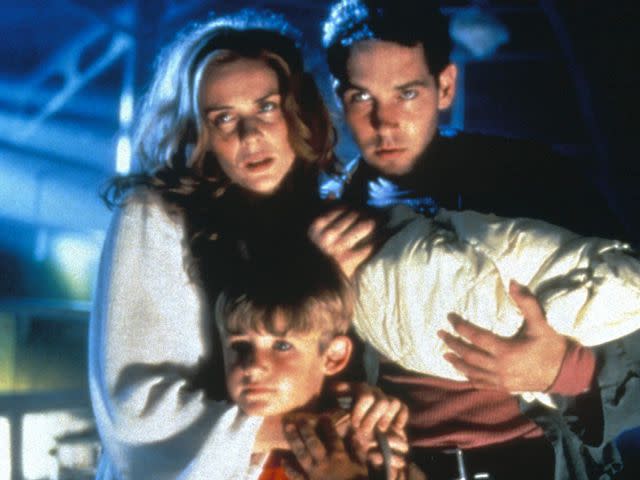
Moviestore/Shutterstock
Devin Gardner and Paul Rudd in Halloween: The Curse Of Michael MyersHalloween: The Curse of Michael Myers picks up on the cult elements that were first sown in Halloween 5: The Revenge of Michael Myers. J.C. Brandy plays an adult Jamie Lloyd, who is now living in what was Michael Myers' childhood home with relatives of her and Laurie Strode's adoptive family.
The film begins six years after the end of Halloween 5, with Myers and Jamie being abducted by a cult. Jamie gives birth to a baby boy named Steven the night before Halloween and manages to escape with the child in tow, and with Myers in hot pursuit of them both.
Paul Rudd stars as a grownup Tommy Doyle, who lives across the street from the Strodes' home, his life consumed with trying to understand Myers. He finds Steven at a bus station, where he runs into Dr. Loomis, played once more by Donald Pleasence in his final role before his death on Feb. 2, 1995.
What follows is a convoluted (but campily entertaining) combination of the occult, genetic engineering and, of course, a lot of slayings.
Quentin Tarantino revealed to Consequence of Sound in 2019 he was actually in the running to write and direct Halloween: The Curse of Michael Myers, though the job eventually went to screenwriter Daniel Farrands and director Joe Chappelle.
The H20 Timeline
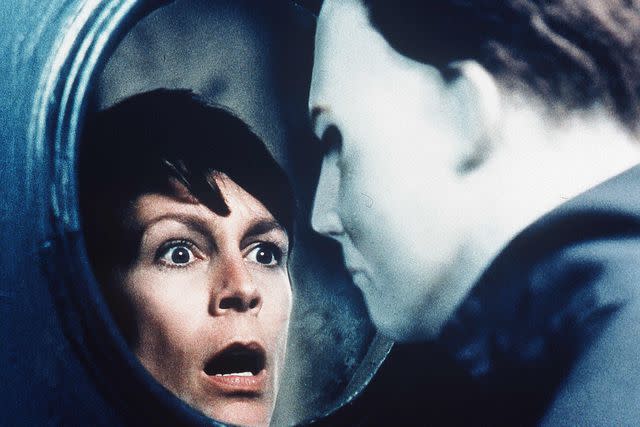
Nicola Goode/Dimension/Kobal/Shutterstock
Jamie Lee Curtis in 'Halloween H20'.Halloween (1978)
The Halloween H20 timeline begins with the original 1978 Halloween, which chronicles the first time Michael Myers terrorizes babysitter Laurie Strode. Curtis' Strode is the heroic final girl of the H20 series.
Halloween II (1981)
Halloween II is canon in the H20 timeline, chronicling Myers' stalking Strode through Haddonfield Memorial Hospital (and likely overcrowding its morgue). The rest of the original timeline, Halloween 4: The Return of Michael Myers, Halloween 5: The Revenge of Michael Myers and Halloween: The Curse of Michael Myers are not canon in the H20 timeline.
Halloween H20: 20 Years Later (1998)
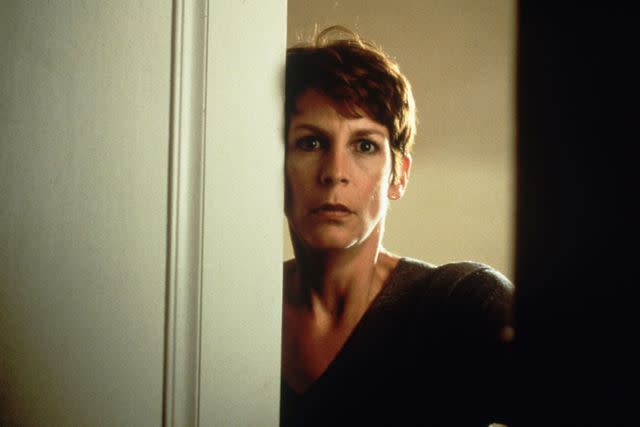
Dimension Films/Kobal/Shutterstock
Jamie Lee Curtis in Halloween H20Curtis returned for Halloween H20: 20 Years Later in 1998, reprising her role of Laurie Strode. In H20, it's revealed that Strode faked her own death and has been hiding from Myers and working at a boarding school in California under the alias Keri Tate. As a result of her trauma, she is overprotective of her son John (Josh Hartnett) and prohibits him from going on a trip with his friends and girlfriend Molly (Michelle Williams). That inadvertently puts John and Molly in the path of Myers, who travels from Haddonfield to California to try to kill Strode once he finds out she's alive.
Curtis previously said she wanted her character's arc to end with Halloween H20, in which she appears to kill Myers in the end … but we all know you can't keep The Shape down for long.
Halloween: Resurrection (2002)
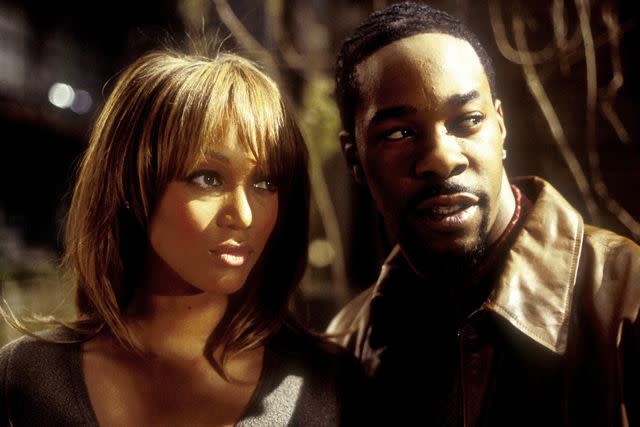
Kimberley French/Miramax/Dimension/Kobal/Shutterstock
Tyra Banks and Busta Rhymes in Halloween: ResurrectionBecause Halloween H20 was such a success, another sequel in the timeline came four years later with Halloween: Resurrection. In the sequel, Curtis as Laurie Strode is in a mental institution after killing who she thought was Michael Myers at the end of H20, but who turned out to be the wrong man.
Curtis recalled telling the writers for Resurrection, "You have to kill me in the first 10 minutes of the movie because I've now killed an innocent man and I can't live with that." They listened, and the rest of the film was largely comical camp — especially a memorable scene with rapper Busta Rhymes holding his own against The Shape.
The Rob Zombie Timeline
Halloween (2007)
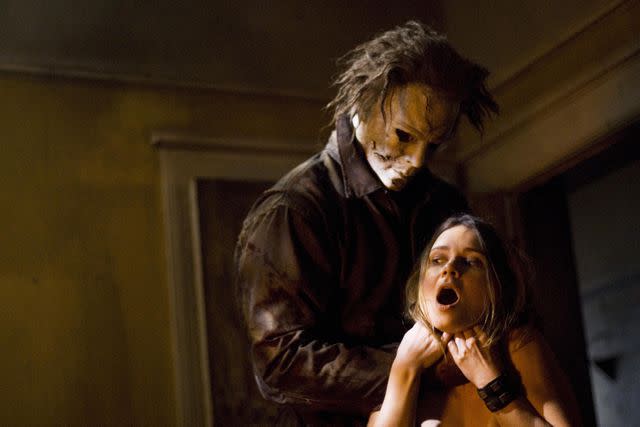
Dimension/Spectacle/Kobal/Shutterstock
Tyler Mane and Kristina Klebe in HalloweenRob Zombie's Halloween is not canon with any of the previous Halloween movies.
"Call it a remake, an update, a reimaging or whatever, but one thing that for sure is this is a whole new start … a new begining with no connection to the other series," Zombie wrote on his blog in 2006 (via Film Threat). He added, "I talked to John Carpenter about this the other day and he said, 'Go for it, Rob. Make it your own.' "
Zombie did just that, rebooting the franchise with an origin story for Michael Myers. The movie begins with a 10-year-old Myers already showing the brutality fo which The Shape was known, then flashes forward 15 years to an adult Myers (Tyler Mane) pursuing his younger sister Laurie Strode, played by Scout Taylor-Compton.
Halloween was significantly more graphic than many of its predecessors, and Zombie said that the gruesome violence was a deliberate choice and that it isn't supposed to be easy viewing.
"I never wanted there to be any moment in the movie when something would happen and the audience would cheer, like sometimes that happens in certain types of horror movies," he explained to Cinema.com. "I was never a fan of that. I wasn't looking for 'inventive' kills, and I even hate that word because if you have these characters screaming or crying in pain, I don't think anyone should be jumping out of their seat cheering. It should be horrible and you should feel sick watching it because that's what it is, sick."
Halloween grossed $30.5 million at the box office over Labor Day weekend in 2007, setting a record that it kept until Marvel's Shang-Chi and the Legend of the Ten Rings debuted in 2021.
Halloween II (2009)
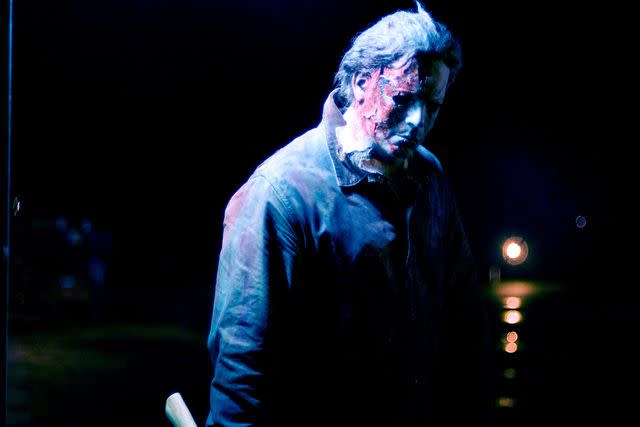
Universal Images Group North America LLC / Alamy
Halloween IIZombie followed with Halloween II, which he later said he preferred to his original Halloween in part because he was able to make it entirely his own.
"I am still proud of both Halloween movies," he said in a 2018 interview. "I prefer the second one, which might surprise people, but the problem is that when you do a remake you can never get a true judgment on what it is you have done."
Despite preferring Halloween II, Zombie admitted on the Howie Mandel Does Stuff podcast in June 2023 that he only made it to get out of his contract with The Weinstein Company, which was originally slated for three movies. Zombie claimed that while he was making Halloween and Halloween II, Bob Weinstein was constantly fighting with him and Harvey Weinstein over the creative direction and commercial appeal of his films, leading him to truncate his three-picture deal to two.
The Last Laurie Strode Timeline
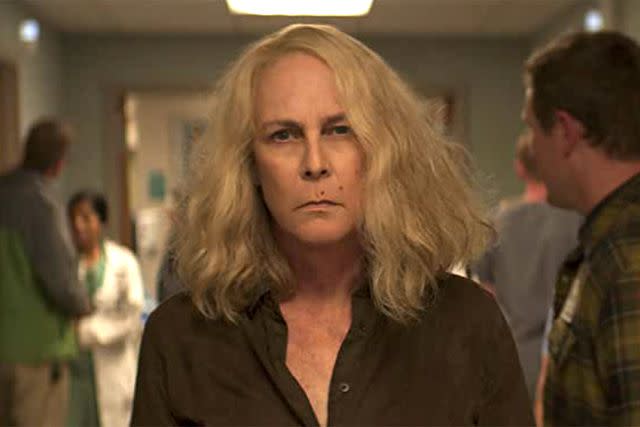
Halloween (1978)
The original 1978 Halloween is the only movie in the franchise that is considered canon for the Laurie Strode timeline trilogy that includes Halloween (2018), Halloween Kills and Halloween Ends.
Because the original Halloween is the only canon film ahead of Halloween (2018), Strode and Michael Myers are not brother and sister in this timeline, as that revelation came in 1981's Halloween II. According to Curtis, that was a very deliberate decision on behalf of writer and director David Gordon Green.
"There is nothing more terrifying in the world than a random act of violence, that is the root of terrorism," Curtis explained to Den of Geek in July 2018. "Not that you see it coming, that something occurs in a horrible way, without you ever thinking it could happen to you, that's what made this movie so profoundly terrifying, is [if] it was random."
Halloween (2018)
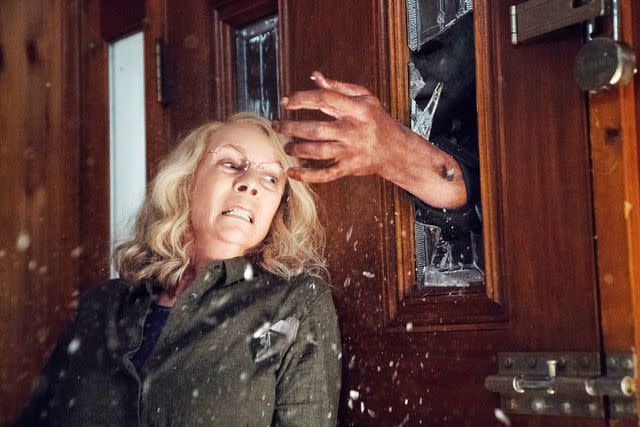
Halloween (2018) takes place 40 years after the events of Halloween (1978) and sees Laurie Strode coping with the trauma she suffered after being targeted by Michael Myers — as well as how that trauma shaped and strained her relationships with her daughter Karen (Judy Greer) and granddaughter Allyson (Andi Matichak).
"[Director David Gordon Green] sent me a script and said [Laurie Strode] spent 40 years hiding behind barbed wire, emotionally and physically," Curtis said at San Diego Comic-Con in 2018, per syfy.com. "At the expense of her daughter and granddaughter, she knows Michael Myers is coming back. It was this incredible film about Laurie and her trauma."
The film also has a message of women's empowerment, which Curtis said is what really drove her to reprise the role that made her a star.
"It was this beautiful movie about a woman taking control of her life," she said. "And it coincided with the women around the world standing up and taking control of their lives and saying 'Me Too, Me Too, Time Is Up and Me Too.' "
Halloween Kills (2021)
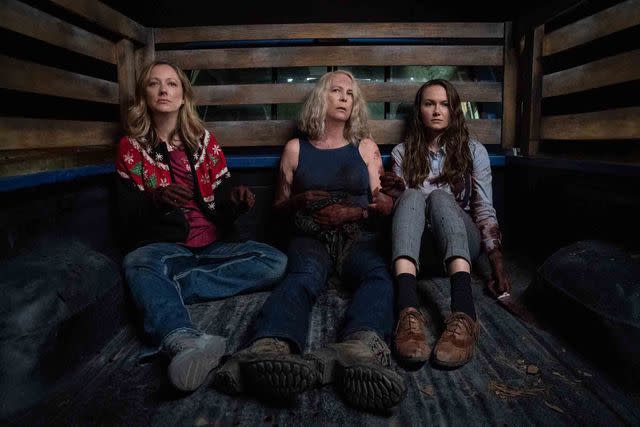
Halloween Kills picks up minutes after the end of Halloween (2018), similarly to how Halloween II begins one minute after the 1978 Halloween. Halloween Kills sees Strode and her daughter and granddaughter leading a pack of Haddonfield residents to hunt for Michael Myers. The cast also includes Anthony Michael Hall as Tommy Doyle and Real Housewives of Beverly Hills star Kyle Richards reprising her role as Lindsay Wallace, both characters being adult versions of Strode's babysitting charges from Halloween (1978).
"It really is my first love and I am enjoying it so much," Richards told PEOPLE about her return to acting. "I felt so comfortable the entire time and working with David Gordon Green. He's such an incredible director and generous and open-minded and [has] no ego. So he really made it easy for me and I loved it. I'm happy to keep doing it."
Halloween Ends (2022)
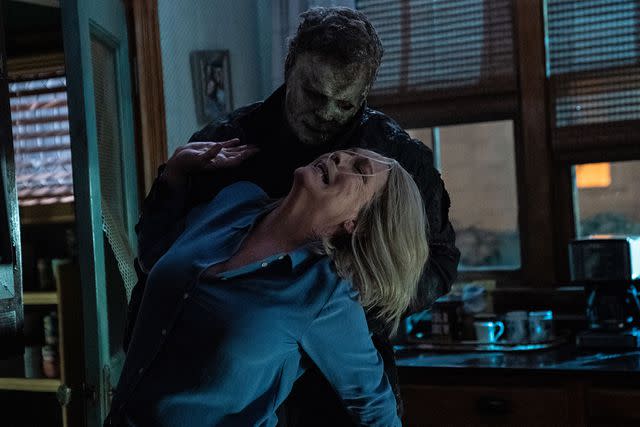
The latest Halloween trilogy ended with the aptly titled Halloween Ends, released in 2022. The movie focuses on how Laurie Strode has coped with the devastating losses she suffered in Halloween (2018) and Halloween Kills — and how her character, like many victims of trauma, is ostracized by the people around her. Strode's experience parallels that of a new character, Corey Cunningham (played by Rohan Campbell).
"It's a movie about how the entire town of Haddonfield has turned against Laurie Strode, the innocent victim whose life was brutalized by Michael Myers, and it just shows what violence does to people," Curtis said in a 2022 New York Comic-Con panel hosted by Drew Barrymore. "These movies are about way more than just Michael Myers and Laurie Strode, they're about who we are."
The Anthology Timeline
Halloween III: Season of the Witch (1982)
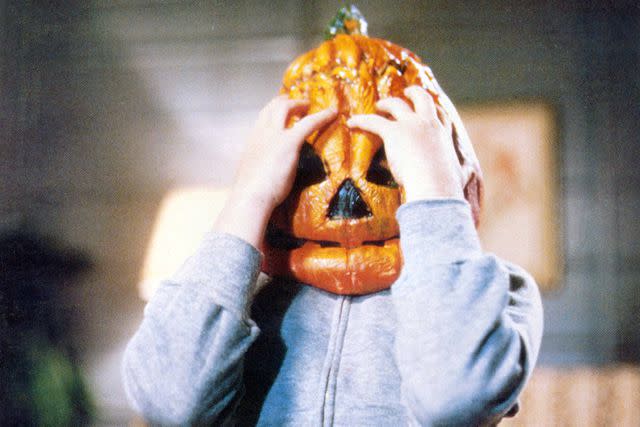
Moviestore/Shutterstock
Halloween III: Season Of The WitchHalloween III: Season of the Witch is a standalone film that doesn't connect to any others in the Halloween franchise.
Carpenter and Hill originally planned the Halloween franchise films to be an anthology of standalone movies taking place on Halloween night, Screen Rant reported, and the creators felt that Michael Myers' arc ended in Halloween II.
Halloween III follows sinister goings-on at the fictional Silver Shamrock mask factory. The cast consisted mostly of character actors including Stacey Nelkin and Tom Atkins, but there were some returning franchise stars as well: Nancy Kyes, who played Laurie Strode's friend Linda in Halloween (1978) and Halloween II (1981), and Dick Warlock, who played Michael Myers in Halloween II, both make appearances in Halloween III: Season of the Witch, and Curtis has an uncredited voice role as a curfew announcer.
While Halloween III: Season of the Witch isn't about Michael Myers, he actually does appear in the film — in a TV commercial for the movie Halloween (1978).
For more People news, make sure to sign up for our newsletter!
Read the original article on People.

